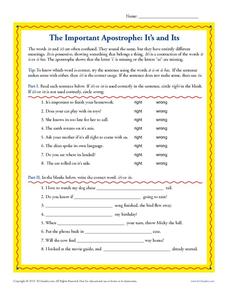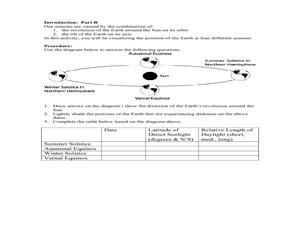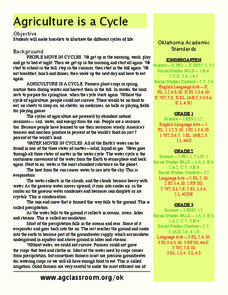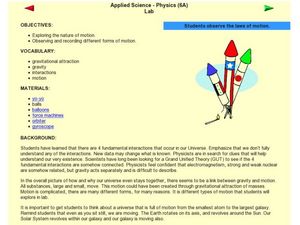Curated OER
Sunspot Graphing
Students, using 15 years of sunspot data, plot data on a classroom graph. They discuss why the pattern from their individual sheets did not and could not match the class graph.
Curated OER
Observing Motion
First graders explore movement and motion. In this motion lesson, 1st graders how objects can move as well as how the Earth is in constant motion and the force of gravity. Students complete a coloring sheet.
Curated OER
The Celestial Sphere
Students are introduced to the celestial sphere, describing its apparent rotation and the special role of the pole star.
Curated OER
In-Line Inertia
Students practice calculating the moment of inertia when discussing a skater and the position in which it is best to spin. After class discussion, students practice calculating inertia on their own.
Bowels Physics
Methods of Motion
How could you earn a $6,000,000 speeding ticket? This presentation uses an analogy that relates speed in the universe to the cost of a speeding ticket. Scholars ultimately understand that motion is relative. Also covered is the concept...
K12 Reader
The Important Apostrophe: It's and Its
Help class members distinguish the difference between its and it's. As individuals read sentences and determine if the use of the two words are correct or incorrectm they fill in the blanks of sentences with the appropriate it's or its.
Curated OER
Seasons and Cloud Cover, Are They Related?
Students use NASA satellite data to correlate cloud cover over Africa to the solar declination.
Curated OER
Suns Path and Seasons
Using a plastic dome to represent the hemisphere of the sky, your class is able to demonstrate the path of the sun at different points of the day and year. They use a protractor to record movement and answer questions about elapsed...
Curated OER
The Solstices
Compare surface temperatures when the solstice occurs in the different hemispheres. Young scientists draw conclusions from their investigation of data collected using spreadsheets and a globe.
Curated OER
True North, Magnetic North
Students explain why compass angles need to be corrected for regional magnetic variation. They observe the difference between magnetic and true north. Each student measures the angle of variation for a town in a different state.
Aiken County Public Schools
Claymation in the Classroom
Students design an appropriate and usable storyboard and then create a claymation video. They take digital photographs frame by frame, then assemble the stop-motion movie using video software.
Curated OER
Agriculture is a Cycle
Students explore cycles in nature. In this cross curriculum agriculture lesson, students define "cycle" and research weather and planting folklore. Students make a bracelet in which individual colored beads represent the many "cycles" of...
Curated OER
Motion Experiment
Students experiment with the laws of motion. In this motion lesson, students explore Newton's Laws of Motion. Students work in groups experimenting with different objects and observing different types of motion.
Curated OER
Chalkboard Challenge: Social Studies Online
If used as an independent review, this presentation could be a quick way for students to study U.S. History facts. Since it only presents a few simple facts, it would not be adequate for a comprehensive review, but a teacher could...
Curated OER
Tide Types
Students record hourly reading for water height for 24 hours and determine whether a location experiences diurnal, semi-diurnal or mixed tides. Links are present for the information. Students predict high and low tide, and answer a set...
Curated OER
Is the Moon out tonight?
Learners talk or read about the way the moon travels across the sky. They then look at the picture of where the moon is and draw where it will be in the picture, later in the evening. Note: The worksheet is intended for third or fourth...
Curated OER
Student Exploration: Phases of the Moon
In this moon phase activity, students complete 2 prior knowledge questions, then use the "Phase of the Moon Gizmo" to complete several activities, answering short answer questions when finished.
Curated OER
It's Just a Phase
Sixth graders are introduced to the correct terminology for the phases of the moon and arrange picture cards in the correct order. They use flashlights and Styrofoam balls to illustrate the phases of the moon. They write science journal...
Curated OER
Sky Pictures
Learners investigate constellations. In this space science lesson, students view transparencies of constellations and identify the zodiac constellations. Learners research the legends connected with the constellations.
Curated OER
Does Santa Claus use the Coriolis Force to Travel East?
Students are given a visual demonstration of the Coriolis Force in the Northern Hemisphere. They are encouraged to find locations around the globe and try to predict what the weather circulation patterns might be like.
Curated OER
It's Time to Make Time!
Learners explore the evolution of time measurement, and explain the relationship of sunrise/sunset to length of daylight. They collect data and calculations to determine length of daylight during a given day.
Curated OER
Agriculture is a Cycle
What do a bicycle and the life cycle have in common? Cover this and more with the series of cross-curricular activities included in this plan. Learners do everything from making bracelets that represent the life cycle to checking out the...
Curated OER
Degrees Of A Circle Exercises
In this math worksheet, middle schoolers examine the fractional parts in order to determine the degree equivalent within a circle. Then they do the same using drawn circles.
Curated OER
Ancient Sun Models of the World
Students explain that many different cultures across the world developed their own reasoning for the weather around them. They explore the different cultural beliefs of the sun's cycle and to create their own story of the sun's movement.

























